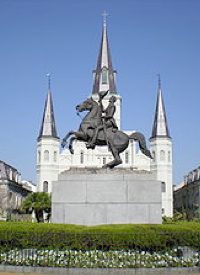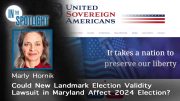
In its press release on Tuesday the Institute for Justice announced it is going to bat for the freedom of tour guides in New Orleans to speak. The city currently has a law in place that says that “no person shall offer to act as a sightseeing tour guide on the roads, sidewalks, public spaces, or waterways of [the city] unless the person holds a valid sightseeing tour guide license.” Violation of the ordinance can result in a fine up to $300 and five months in jail.
Matt Miller, the lead attorney in the case brought by the public interest firm, stated firmly that “the government cannot be in the business of deciding who may speak and who may not. The Constitution protects your right to communicate for a living, whether you are a journalist, a musician or a tour guide.”
Under the law being challenged in court, freedom of speech isn’t free as obtaining a license to speak requires tour guides to take and pass a history exam, undergo a drug test and submit to an FBI criminal background check — every two years. Candance Kagan, the lead plaintiff in the case, survived Hurricane Katrina, but says now “I’m being knocked out of business again, this time by the city I love.”
The Institute for Justice has been fighting battles like these for 20 years with a remarkable, and reassuring, degree of success. They have a similar case pending in Washington, D.C. where local laws make it illegal for anyone without a license to conduct guided tours for compensation. IJ says that “DC’s tour-guide licensing scheme is unconstitutional. Simply put, the government is not allowed to require people to get a license in order to talk…The Constitution does not allow the government to be in the business of deciding who is — and who is not —allowed to speak on various topics.”
In a case IJ brought back in 2008 in Philadelphia to challenge a similar law, IJ made it clear from the start: the First Amendment rights to free speech cannot be overridden by local governments, especially in the city known for the adoption of the Declaration of Independence by the Continental Congress on July 4, 1776 as well as the adoption of the Bill of Rights on the corner of 6th and Chestnut on December 15, 1791.
The law required tour guides to answer correctly at least 65 percent of 150 questions about the city’s historic sites in an attempt to make sure that their customers were getting accurate information. One of the tour guides not supportive of the suit, Ron Avery, was the one who proposed the 150 questions to the City Council. His support for the law consisted of claiming that history is so important to Philadelphia’s “branding, messaging and identity” that its millions of visitors must be protected from “a great abundance of misinformation … it would force guides to study a little. What’s the big deal?”
The big deal, as Mike Tait, the lead plaintiff in the suit explained, is that “America was founded by people who stood up and said to the king of England, ‘What you’re doing isn’t fair.’ That’s pretty much the same thing here.”
In an interview with Robert McNamara, the lead attorney in the case, the final resolution was the “surrender” by the city which agreed not to enforce the law. McNamara asked the court to require that the law be stricken but the court refused. Instead, several of the guides joined forces to create the Association of Professional Tour Guides — a voluntary association — to allow anyone interested in joining to improve their understanding of history and their presentations to the public. This, of course, is the free market response to licensing: make it voluntary, and let the customer decide if such private certification really matters when they come to Philadelphia and take a tour.
The case for freedom is strong and the Institute for Justice is successfully defending it.
Photo: Jackson Square, New Orleans



